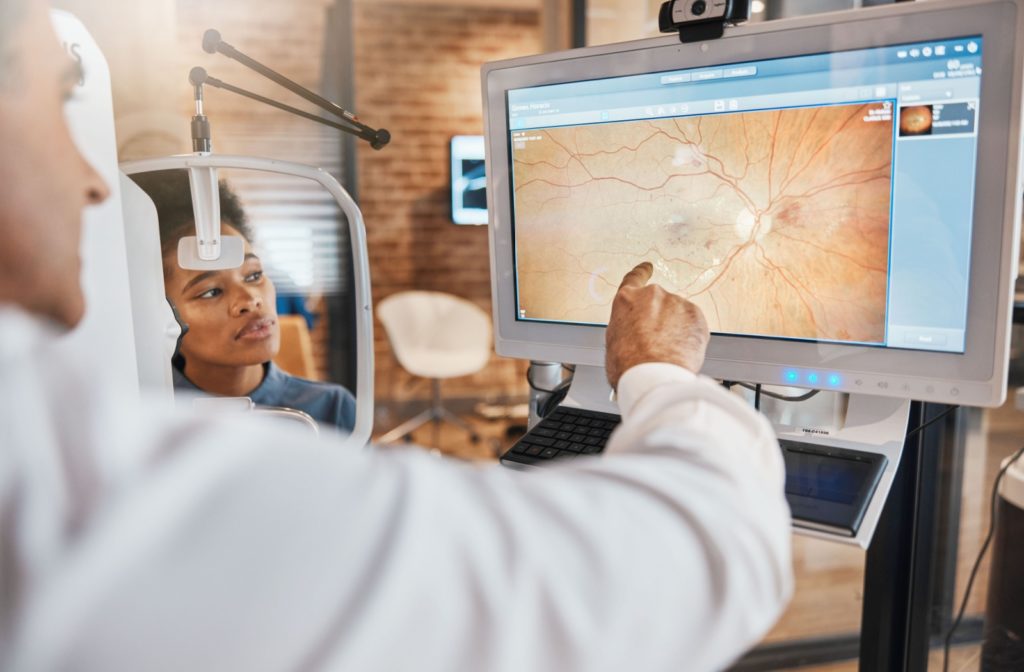The inner workings of our body are all connected. Chronic conditions targeting one part of our body can also influence other bodily functions. Some may be surprised to learn that signs of general health conditions can manifest in our eyes.
Similarly, certain chronic conditions like diabetes can affect our vision and overall ocular health.
No, diabetes doesn’t cause macular degeneration. This health condition can increase the likelihood of developing certain eye conditions, but macular degeneration isn’t one of them.
Instead, diabetes can lead to diabetic retinopathy or diabetic macular edema, two conditions that mimic macular degeneration. Or, diabetes can worsen existing macular degeneration.
How Diabetes Affects Ocular Health
Diabetes is a chronic condition marked by high sugar levels in the blood.
When blood sugar levels are high, also known as hyperglycemia, it can have several detrimental effects on the body, including the eyes.
There are two main types of diabetes:
- Type 1 diabetes: An autoimmune condition where the body attacks insulin-producing cells in the pancreas, significantly reducing insulin production.
- Type 2 diabetes: This is more common and develops when the body becomes resistant to insulin or doesn’t produce enough of it.
Having diabetes doesn’t mean that eye health becomes compromised. Rather, problems generally occur when diabetes remains unmanaged.
Having high blood sugar levels from unmanaged diabetes can damage various parts of the body, including the eyes. When sugar levels remain elevated, over time, they can damage blood vessels throughout the body, including those that supply the retina.
Leaving diabetes unmanaged for an extensive time increases the risk of developing eye conditions, including:
- Diabetic retinopathy: Elevated blood sugar levels damage the small blood vessels in the retina, leading to vision impairment and possible blindness if untreated.
- Diabetic macular edema: Caused by the onset of diabetic retinopathy, this leads to swelling and fluid accumulation in the macula, which is part of the retina, leading to vision distortion and loss.
- Cataracts: Diabetes can cause the eye’s natural lens to cloud sooner, leading to blurry and hazy vision.
- Glaucoma: People with diabetes are at a higher risk of developing glaucoma because of increased pressure in the eye, which can damage the optic nerve and lead to vision loss
- Retinal detachment: Advanced diabetic retinopathy can lead to scar tissue that may pull the retina away from its underlying tissue, which could result in blindness if not treated quickly.
The key to maintaining good overall health and vision is to manage diabetes, which helps minimize the risk of developing these serious eye conditions but doesn’t eliminate the risk entirely.
Diabetes & Macular Degeneration
Macular degeneration is an eye condition that primarily affects the macula, the part of the retina responsible for sharp, central vision.
The macula allows us to read, drive, and recognize faces. When macular degeneration develops, it can lead to the gradual loss of central vision, making everyday tasks that require detailed vision more challenging.
There are two main types of macular degeneration, dry and wet.
The dry form is most common and progresses gradually, slowly reducing central vision. In contrast, the wet form is marked by abnormal blood vessel growth under the retina, which can cause more rapid and severe vision loss.
Early symptoms of this condition generally include:
- Blurry or distorted vision
- Difficulty reading small print.
- Dark spots in the central field of vision.
Diabetes is directly linked to several eye conditions, but macular degeneration isn’t one of them. Macular degeneration is largely caused by the natural aging process and genetic factors. Instead, diabetes can mimic or aggravate macular degeneration.
Complications of diabetes like diabetic retinopathy and diabetic macular edema affect the retina and macula similarly to macular degeneration. The damage caused by prolonged high blood sugar levels makes blood vessels in the retina more prone to leak, swell, or get blocked, affecting central vision, which is managed by the macula.
Plus, diabetes can potentially worsen existing macular degeneration because of vascular damage, oxidative stress, and overall eye inflammation.
There is no cure for macular degeneration, but the condition can be managed to slow its progression. Therefore, managing diabetes is necessary to reduce the likelihood of developing eye conditions that can mimic macular degeneration, and prevent the condition from worsening.
Current research continues to explore the relationship between diabetes and macular degeneration.

The Importance of a Diabetic Eye Exam
Currently, there is no cure for diabetes, but it can be effectively managed through lifestyle changes, medication, and regular medical care (including vision care).
Management focuses on maintaining normal blood sugar levels to prevent complications and reduce the likelihood of developing eye conditions.
Since diabetes can lead to eye conditions that mimic or worsen macular degeneration, monitoring your ocular health is an important component of diabetes management.
It helps address the onset of any sudden or concerning ocular symptoms, like flashes, floaters, or pain, and detect any diabetic changes to the eye and signs of eye conditions. Many of which, can manifest and progress to none to minimal symptoms.
Regular diabetic exams are key to detecting and managing eye conditions before they worsen.
People with diabetes are encouraged to have an annual diabetic eye exam. This thorough ocular health assessment focuses on detecting early signs of diabetic eye diseases by assessing the health of the retina and ocular blood vessels.
Using specialized drops, the pupils are dilated to get a closer look at the internal structures of the eye for diabetic changes that may not be seen as clearly in an undilated exam. The drops will temporarily blur vision and cause light sensitivity for a few hours.
To assess the retina, fundus photos, and OCT scans help to capture detailed images of the macular, optic nerve, and blood vessels.
Schedule an Appointment
Taking care of our ocular health includes managing and monitoring general health conditions, like diabetes. Since diabetes can impact our ocular health and visual clarity, visiting your optometrist for an annual diabetic eye exam is strongly encouraged.
Connect with our team at Total Vision La Mesa to schedule an appointment for your diabetic eye exam.



